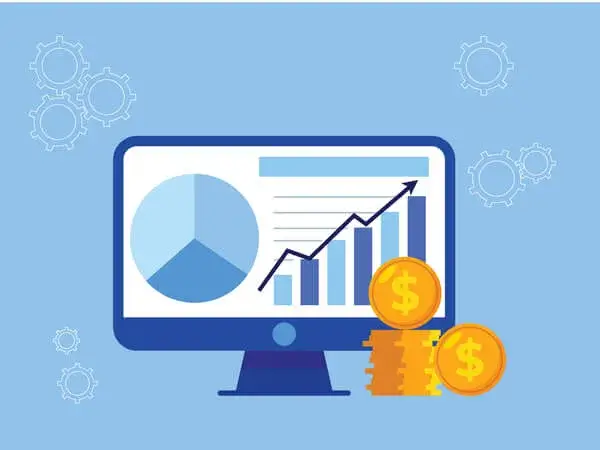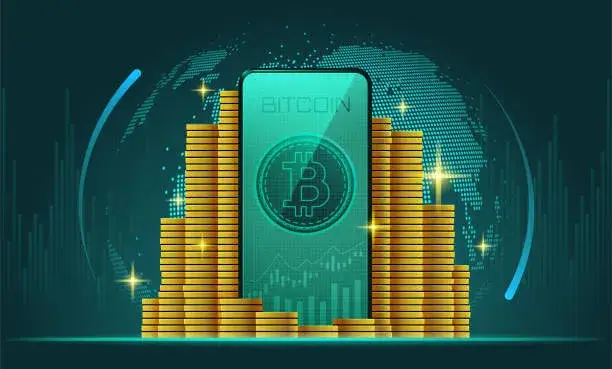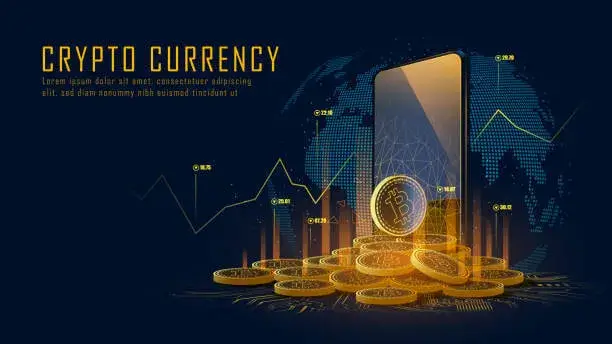When someone begins contemplating Blockchain technologies, they typically inquire about the definition of Blockchain and Cryptocurrency.


When someone begins to consider Blockchain technologies, they often ask questions such as “What exactly is Blockchain and Cryptocurrency?” and “How can I gain a foundational understanding of Blockchain?”. Essentially, they seek a basic comprehension of these concepts.
A blockchain, in its most basic form, is a database. Also, it is a collection of stored information or data in an electrical form. A Blockchain has several distinguishing characteristics which can set it apart from traditional databases.
The most well-known and contentious application of Blockchain is in Cryptocurrency. Cryptocurrencies, such as Bitcoin, Ethereum, and Litecoin, are digital currencies or tokens which are used to buy goods and services in a digital form.
This article will commence with an overview of blockchain, which is the underlying technology that enables cryptocurrencies such as Bitcoin to operate. Subsequently, we will examine the functioning of cryptocurrencies. Lastly, we will briefly explore the Bitcoin phenomenon in the context of blockchain.
In October 2008, a proposal for Bitcoin, a virtual currency system was introduced. It was presented in a disregarded central authority for generating currency, and transferring ownership & transactions. The proposal included blockchain whose first implementation was Bitcoin.
There are obvious connections between blockchain transactions and TCP/IP. Bilateral financial transactions are possible with bitcoin, as they are with e-mail. The development and maintenance of blockchain with TCP/IP is open. Not only that, but it is also dispersed and shared.
The core software of this combined technology is maintained by a worldwide team of volunteers. Similarly to email, Bitcoin was first utilized by a passionate group of users.
Subsequently, various replications were implemented whereby the ledger was distributed across numerous identical databases. However, in a blockchain system, each block is hosted and maintained by a vested party. Additionally, any changes made to one copy are instantaneously updated across all other copies.
As soon the transactions take place, permanent records of the value & assets get an exchange. These are the assets that reside in all ledgers. Third-party intermediaries are not required to verify or transfer ownership. A stock transaction would be settled in seconds on a blockchain-based system. In a very secure manner by verify it.
Cryptocurrencies, allows you to keep your money without a bank. Which has been the most high-profile usage of blockchain in fintech. There are people who buy Bitcoin, Ethereum, or other cryptocurrencies. They can store these cryptocurrencies in digital wallets. Other way, wallet owners have a private key that allows them to send and spend crypto. As well as sending a public address that allows them to accept payments from other people.
Early this year, PayPal opened cryptocurrency buying and selling in the United States. It allows the clients to use their hold digital coin. Hence, for the sake of buying at PayPal’s network of millions of merchants.
The company had some strategic thoughts upon the new asset class. Moreover, they came up with an idea, as soon get enter into class, it would boost the global use of their virtual coins. Further, it will prepare their network for digital currencies. So that, other corporations and central banks might produce it as well.
More recently, President Nayib Bukele of El Salvador, a tech-savvy millennial also responded. He has encouraged the adoption of digital currency. Moreover, he portrayed it as a method to bring more Salvadorans into the economy.
El Salvador is a country with around 70% of the population lacking bank accounts. Thus, he claims that using Bitcoin would make receiving remittances from overseas faster. Henceforth, even get cheaper remittance with this technology. He thinks it would free his indebted country and free them from the grip of the traditional global banking system.

As mentioned above, the blockchain is a decentralized public ledger. Henceforth, it underpins the entire cryptocurrency network. According to the blockchain definition, it contains all confirmed transactions. It enables digital wallets also called blockchain wallets. This digital wallet calculates their spendable balance.
Moreover, it allows new transactions and makes confirmation of them. It also ensures that these transactions must own by the spender. Cryptography is thus used to ensure the blockchain’s integrity in chronological order. Let’s look at a simple blockchain example:
In a certain cryptocurrency, a person has 100 coins. These coins, keeping in a digital wallet that contains both a public and private key. Only the said person has access to the private key, which binds their coin to that key. The public and private keys have a linkage architecture so, it is allowing them to send and receive money.
Now let’s say this person wishes to buy a product from a vendor. He wants to spend ten bitcoin coins upon it. So, he agrees to send this amount from their wallet to the vendor’s wallet. For this purpose, he uses his public key to verify the vendor’s identity.
This person’s private key has a digital sign for all the transactions. After that, the transaction is recorded and broadcasted to the rest of the cryptocurrency network. Hence, the validated transaction in the network ensures that it is genuine.
Consequently, when the user possesses adequate funds to finalize the transaction, it is appended to the subsequent block in the blockchain. This, along with multiple other blockchains, verifies the transaction.
We have yet to delve into the topic of utilizing blockchain for businesses, which is another facet of the blockchain and cryptocurrency predicament. Additionally, there is the practice of cryptocurrency mining, which involves mining blockchain and cryptocurrency.
Further, a small fraction of users in the network race to answer a challenging math’s puzzle. In order to add a new block to the blockchain and thereby verify the transactions within that block. All packed transactions in a block adhere to very tight cryptographic requirements. These requirements need validation to some extent. This validation came to form the network as confirmed.
These restrictions make it impossible to change prior blockchain blocks. The reason is that doing so would invalidate all upcoming blocks in a network. Mining also provides a competitive lottery. Moreover, it prevents anyone from adding new blocks on the spot.
Besides this, it adds the blocks to the blockchain in sequential order. No group or individual can control what to include or exclude in the blockchain. No one can even replace parts of the block chain to roll back their spending in this way.
Building on the previously described cryptocurrency definition, we can now become more acquainted with different types of cryptocurrencies.
According to SoFi, there are about 10,000 different types of cryptocurrency. According to an update of April 2021, it has two groups by division.
Any coin that isn’t a Bitcoin, referred to as an altcoin. Bitcoin is a prominent example that operates in a sole manner. It functions in a central bank or government agency (i.e., government-backed Treasury).
The term “altcoin” actually refers to a cryptocurrency, an alternative to Bitcoin. Namecoin, launched in 2011, has regarded as the first altcoin. All cryptocurrencies listed here, like Bitcoin, have a finite quantity of coins.
The reason behind it is that it maintains the balance and reinforces their perceived value. Some limited Bitcoins can exist to 21 million. As determined by the Bitcoin creators, yet, some remain to mine. Once all 21 million have touched, the number varies as mined fresh blocks. The only way to increase the amount of money coming in is for Bitcoin’s protocol to allow it.
Tokens, unlike altcoins, producing and distributing through an Initial Coin Offering, or ICO. In the beginning, the intentions were to use this to describe a function rather than as a form of money. They, like American dollars, reflect value but are not valuable in and of themselves.
Bitcoin is one of the most popular cryptocurrencies. After the financial crisis in 2008, the digital currency was born. It was essential to follow a mechanism for consumers to buy things so they could trade money without having to go to banks or financial organizations. Even though Bitcoin was worth less than $0.01 at the time. It was in May 2010, when the first transaction was taken.
For 10,000 BTC, two pizzas were sold out. That sum of BTC is currently worth over £350 million at the time of writing. Bitcoin’s price has risen and fallen throughout the years. Each Bitcoin was worth roughly $1,000 at the start of 2017. It had reached a high of $20,089 by December of that year. Yet, prices began to fall following that, before reaching a new high around the end of 2020.
There are 18,810,456.25 bitcoins in circulation right now. When mining fresh blocks, this number changes every 10 minutes or so. At the moment, each new block contributes 6.25 bitcoins to the system.
Blockchain-powered Crypto, eliminates the need for personalized currencies and central banks. With blockchain, anyone can transfer crypto to anybody, anywhere in the world. Also, it can do this without the need for currency conversion.
This is because each cryptocurrency possesses a unique identification number that is linked to a specific owner, which ultimately heightens the security of the blockchain and makes theft more challenging.
Top quality ensured or we work for free
